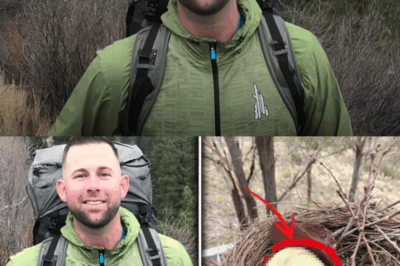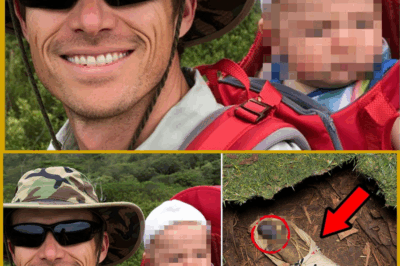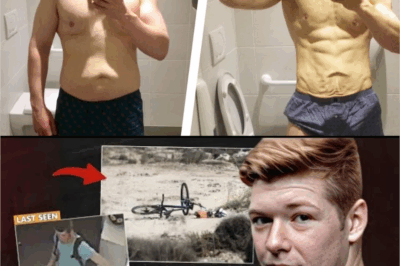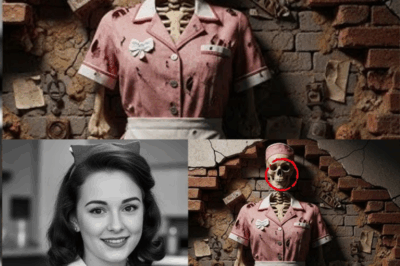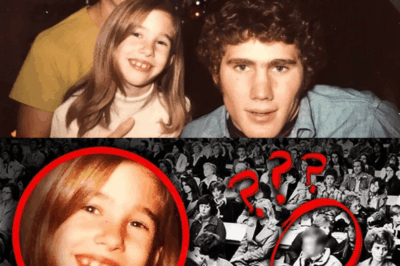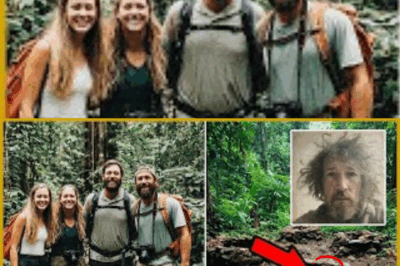
The hospital lights flickered faintly against sterile walls, the air thick with the mingled scents of antiseptic and newborn cries. Somewhere down the hall, a machine beeped in slow, steady rhythm, like a metronome counting the fragile beginnings of life. Nurses in pale scrubs glided across the linoleum floors, their footsteps softened by rubber soles, their voices hushed. Behind one closed door, however, silence held heavier, as though the entire building paused to take in the man inside.
He sat hunched forward in a white sweatshirt, shoulders tense as though carrying a weight no one else could see. In his arms lay two tiny bundles, swaddled tightly in striped blankets, their faces soft with the unknowing peace of first breaths. He cradled them carefully, almost too carefully, as if afraid the tattoos inked into his skin might somehow bleed onto their innocence.
But it wasn’t the babies that drew startled stares from everyone who passed by. It was him. His face, transformed into a skeletal mask of black and grey, hollow eyes carved by ink, jaw etched with the grin of death itself. Even his hands, which trembled as they clutched the infants, were covered in markings—bones, scars, fragments of a life written permanently into flesh.
A nurse paused at the door, chart in hand, eyes widening before she quickly looked away. A whisper floated down the hallway, caught by another ear, then another. “That’s the father?” The words were not cruelly intended, but they carried the sharp sting of judgment, echoing louder than any shout.
For most of his life, judgment had followed him. His name was Michael, but to strangers he was something else entirely: freak, criminal, monster. At twenty-one, his body had been nearly covered in tattoos. By twenty-five, even strangers crossed the street when he walked near. He remembered the first time he saw fear in a child’s eyes—not because of something he’d done, but because of how he looked. He had pretended not to notice, but the image never left him.
The ink was armor, carved during years when the world gave him nothing but fists and slammed doors. Pain had no language in his home growing up, so he gave it form on his skin. Every scream was a line, every wound a picture. To outsiders, it was rebellion. To him, it was survival. Yet survival had a price, and that price was written on every stranger’s face.
Even now, in the hospital where life was supposed to be celebrated, the whispers gnawed at him. “Monster.” “Bad dad.” “Poor children.” Each word seared into him like hot iron. A visiting mother in the waiting area gasped when he walked past with one of the babies. An older man muttered, “Imagine waking up to that face every morning.” Even the security guard’s gaze lingered too long, suspicion dripping from his silence.
That night, when visitors were gone and the room dimmed, Michael sat alone with his children. The babies’ breathing was soft, their tiny chests rising and falling against him. The silence should have been comforting. Instead, the walls pressed close, the air heavy with invisible eyes. He thought he heard footsteps outside, then voices. Not nurses this time—darker, harsher. “You don’t belong here.” “You can’t protect them.” “Your children will fear you.”
The voices were not new. They had lived in his head for years, whispering each time he faced a mirror, reminding him of what the world already believed. But tonight, the whispers carried a sharper edge, for the stakes had changed. Two fragile lives now depended on him, and the voices wanted him to believe he was unworthy.
Morning brought no relief. Nurses came with charts, relatives came with flowers, and the doctor offered congratulations. The world spun normally around him, but every glance cut deeper. A nurse leaned closer at one point, her tone gentle but piercing: “You should consider covering your face—for the children’s sake.” The words struck like a knife. He rose too quickly, startling the infant in his arms. For a moment, old anger surged—the rage that had once driven him to bars, fights, tattoo chairs where he bled into ink until dawn.
But then he looked down. The baby’s eyes fluttered open for an instant, then closed again in trust. His anger dissolved, replaced by something heavier: resolve. He would not let the world dictate what his children saw in him. Not this time.
Michael’s past was far from spotless. There were nights he could not remember, scars he could not erase, mistakes he carried like stones in his chest. The tattoos were not decoration—they were a ledger of debts, proof of a man who had wandered too close to the edge too many times. Sometimes even he recoiled from his own reflection. Yet fatherhood, he realized, was not about erasing the past. It was about rewriting the future.
When the babies were discharged, he carried them through the lobby. Every head turned. A boy pointed and whispered. An elderly woman clutched her purse tighter. A security guard followed him with suspicion until he stepped into sunlight. The weight of eyes pressed down like chains, but the cries from his children anchored him. Society would never forgive his face, but perhaps his children would see beyond it.
Weeks later, he stood in front of the mirror at home, the babies asleep in the next room. He traced the lines of ink across his cheeks, jaw, and skull. “Will they hate me?” he whispered to his reflection. The voices returned instantly, mocking. “They will see what everyone sees. They will grow up afraid. You can never change what you are.” He pressed his palms against the sink, breath quickening.
A cry from the next room pierced the whispers. He turned, walked down the hallway, each step echoing like a drumbeat. At the crib, he looked down at the small face staring back at him, unafraid. A tiny fist reached up, clutching his finger. For a fleeting moment, the voices fell silent.
But silence never lasts. He knew that soon, louder judgments awaited outside—neighbors, strangers, teachers, doctors, all ready to decide what kind of father he could be without ever knowing him. Worse still, danger did not always wear the face of prejudice. There were darker shadows ahead, ones that would test not just how society saw him, but how far he would go to protect the children who had chosen him as their father.
And that part of the story—what happened after, when whispers became shouts, when fear turned into confrontation, when Michael’s past came knocking at the very door of his children’s future—is not one I can tell you here. Not yet.
Because to understand what came next, you would have to walk into the silence of that hospital room, look into the inked face everyone feared, and see what no one else dared to: not a monster, but a man holding life in hands the world said were unworthy. And when you discover what unfolded after that moment, you may never look at judgment the same way again.
News
El eco del bosque: la desaparición de Daniel Whitaker
El amanecer en las Montañas Rocosas tiene algo de sagrado. La niebla se desliza por las cumbres como un animal…
El eco del silencio: la tragedia en los Andes
El viento cortaba como cuchillas de hielo mientras el sol, difuso entre las nubes, teñía de oro pálido las laderas…
Desapareció en el desierto… y cuando lo hallaron, pesaba solo 35 libras
El sol de Arizona golpeaba sin piedad sobre la tierra agrietada cuando los agentes encontraron la bicicleta. Estaba tirada de…
🕯️ Última Noche en el Old Maple Diner
Era una de esas noches en que el viento se colaba por las rendijas de las ventanas y hacía sonar…
700 personas no lo vieron: el día que Margaret cambió el destino del asesino dorado
Había música, risas y el olor dulce del barniz nuevo en el auditorio de la escuela de Sacramento. Era una…
Cinco viajeros desaparecieron en la selva de Camboya… Seis años después, uno volvió y contó algo que nadie quiso creer
Cuando el avión aterrizó en Phnom Penh, el aire parecía tan denso que podía cortarse con un cuchillo. Cinco jóvenes…
End of content
No more pages to load

